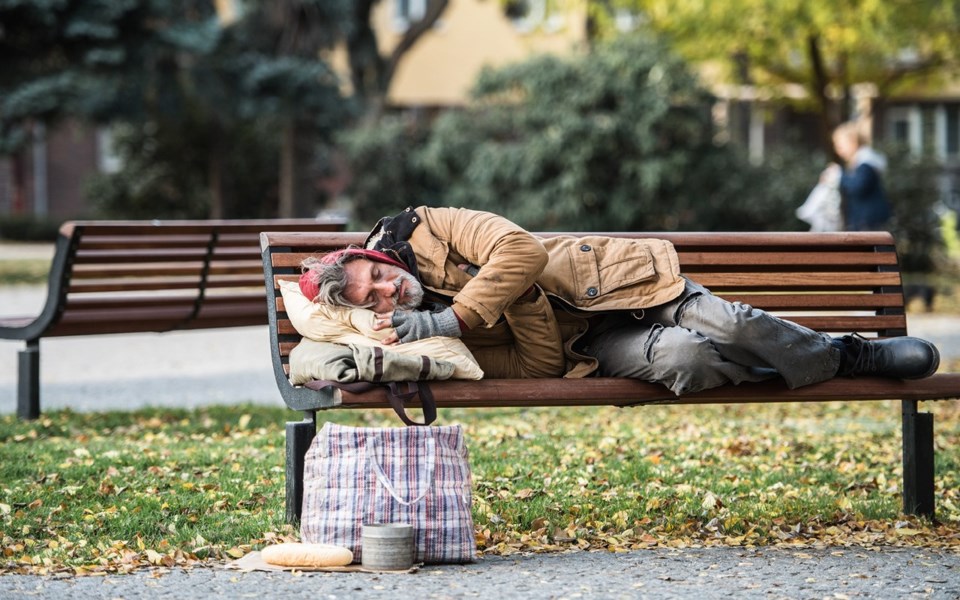Hundreds of smartphones handed to Downtown Eastside (DTES) residents and other vulnerable individuals across the Lower Mainland and the rest of B.C. won't be used for pandemic contact tracing, B.C.'s Ministry of Social Development and Poverty Reduction says.
Rather, the ministry said, the 3,500 phones would be distributed province-wide through work with both 7-Eleven and Telus to assist vulnerable people, including the homelessness, in having access to services.
That access was slowed by the pandemic with the restriction of access to such things as public computers in libraries and other closed facilities.
The DTES Response website said there are 15,000 at-risk people at risk in the poverty-and addiction stricken neighbourhood, including 3,000 homeless and 4,700 in single room occupancy (SRO) hotel rooms.
"The need for internet connectivity has never been as important as it is right now. For people who are experiencing homelessness, the closing of public spaces like libraries due to COVID-19 has reduced connectivity options and created barriers to supports and services," Minister of Social Development and Poverty Reduction Shane Simpson said in a news release.
"Providing smartphones for people on the street will help create easier access to those services, help people maintain physical distancing and support people in staying connected to family and friends during this time."
Asked if the phones would be used for contact-tracing of people, ministry spokesperson Roxanne Kropp said, "No. Given the closure of businesses offering face-to-face services, and the closure of libraries, which offer free access to computers, the intent of the phones is to allow people access to basic communication and to access necessary services online."
Contact tracing, or the use of an application on phones to track contacts of those with COVID-19 infections, arose recently after Premier John Horgan mentioned it in a news conference.
B.C. Information and Privacy Commissioner Michael McEvoy told Glacier Media the issue has been under discussion with the Ministry of Health and provincial chief health officer Dr. Bonnie Henry.
https://biv.com/article/2020/05/will-you-share-covid-19-infection-contact-data-government
"Our public health teams have been exploring a variety of app-based digital technologies to assist with contact-tracing, however we are still assessing their value and how they might be incorporated into our efforts against COVID-19 in B.C.," Henry said.
"Any information would be voluntarily collected," McEvoy said. "It would only be used for one purpose and that's for fighting COVID-19."
Phone distribution
Through the provincial Homelessness Community Action Grant program and a partnership with 7-Eleven, the Social Planning and Research Council of BC (SPARC BC) obtained 3,500 smartphones to be distributed by community organizations.
So far, 1,000 smartphones have been distributed, 200 of which went to people leaving the tent city at Vancouver's Oppenheimer Park and Victoria's Pandora Avenue and Topaz Park encampments as they move to temporary accommodations.
SPARC BC is expected to distribute the additional 2,500 smartphones to organizations and community response networks throughout the province.
The Downtown Eastside SRO Collaborative received 500 phones for low-income residents living in one of the area's 4,500 SROs.
The smartphones can connect to Wi-Fi and include a pre-loaded $10 7-Eleven data card for Internet access.
Through DTES Response and Central City Foundation, many of these smartphones have been paired with SIM cards donated by TELUS to provide $0 rate plans including unlimited nationwide talk and As well, Wi-Fi providers have opened existing Wi-Fi networks to the public to better connect vulnerable people with support.
"The SRO Collaborative has saved the $10 cards that came with the phone as they can be used anytime and can help individuals remain connected longer," said. "The TELUS plans they organized for most of the 500 phones they received have just helped to create additional capacity and opportunity."
Kropp said the phones come with the standard safeguards of a smartphone. The model is the FIGO-Orbit II smartphone obtained through 7-Eleven.
She said nothing prevents people from adding applications to their phones.
"The phones were donated to organizations that support vulnerable people who otherwise do not have access to phones," Krupp said. "There is no connection between the TELUS phone plan and the downloading of applications. Anyone with a credit card is capable of downloading an app from an app store."
@jhainswo



